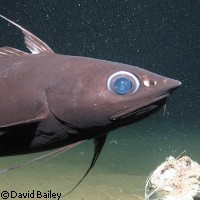Deep sea fishing impacts greater than thought, experts warn
The impacts of commercial fishing appear to extend far deeper than expected. According to new EU-funded research, a study of fish numbers off the west coast of Ireland reveals that even fish populations living at depths of 2,500 metres, far beyond the reach of the fishing nets and lines of trawlers, have dwindled since deep-water fishing took off in the area in the late 1980s. 'Commercial fishing may have wider effects than anyone previously thought, affecting fish which we assumed were safely beyond the range of fishing boats,' commented lead researcher Dr David Bailey of the University of Glasgow in the UK. 'We were extremely surprised by this result and believe that it has important implications for how we manage the oceans.' The research, published in the Proceedings of the Royal Society B, received EU funding through the HERMES ('Hotspot ecosystem research on the margins of European seas') project, which is financed under the 'Sustainable development, global change and ecosystems' Thematic area of the Sixth Framework Programme (FP6). Additional EU support for the research came from the LOTUS ('Long time-series undersea surveillance') project, a Marie Curie initiative financed under FP6, and a grant made under the MAST II ('Marine science and technology') budget line of the Fourth Framework Programme (FP4). Commercial fishing gears, typically, reach down to depths of around 1,600 metres. Scientists have long known that deep-water fish, which tend to live longer and mature later than most commercial species, are particularly vulnerable to over-fishing. However, until now, it was thought that fish populations living beyond the reach of the trawlers would be spared. In this latest study, the researchers analysed fish population data spanning a quarter of the century. The site, in the north-east Atlantic off the west coast of Ireland, was first studied from 1977 to 1989, as part of an investigation into the species living there and their biology. The same area was mapped again from 1997 until 2002, using the same ships and study methods to ensure that the data gathered could be accurately compared with that collected during the earlier period. In the meantime, a commercial deep-sea fishery (mostly targeting roundnose grenadier, black scabbardfish, orange roughy and some deep-water shark species) started operating in the area in the late 1980s. In this latest study, the scientists compared the data from the two periods to see what effects the new fishery had had on local fish populations. To their surprise, they found that deep-sea fish numbers at all depths down to 2,500 metres (i.e. a kilometre beyond the reach of the fishermen), were significantly lower in the second period than in the first period. Species whose natural depth ranges fall at least partly within reach of the trawlers were most affected. The study also revealed that both target and non-target species were impacted by trawling activity. 'The deep-seas fishery targets relatively few species, and unwanted species are discarded. These can make up around 50 % of the catch, and because of the extreme change in pressure and temperature when they're brought to the surface, none of these will survive,' said Professor Monty Priede of the UK's University of Aberdeen. 'This explains why the study has shown a decrease in abundance of target and non-target species.' This raises the question of why the impacts of the fishery are so far reaching. One possible explanation lies in the life cycle of the fish; many species live nearer to the surface (and so within reach of the trawlers) when young, and only move down to deeper waters as they age. In addition to this, many other species may move into shallower waters as part of their normal activity, bringing them within reach of the fishing nets and lines, if only temporarily. Plans are afoot to establish Marine Protected Areas (MPAs) in the north-east Atlantic. However, the researchers are sceptical that these will provide deep-water fish with the protection they need. 'Marine Protected Areas need to be much bigger than the existing coral-protecting MPAs,' stated Professor Priede. 'They are not very effective for mobile fish species unless the fishing effort is reduced. As Dr John Gordon of the Scottish Association for Marine Science, one of the authors of the paper, concluded, 'The general consensus is that deep-water fisheries are unsustainable and most, if not all, should be closed.'
Countries
United Kingdom

